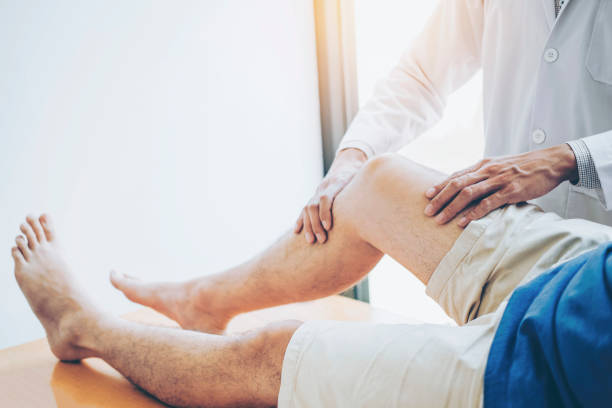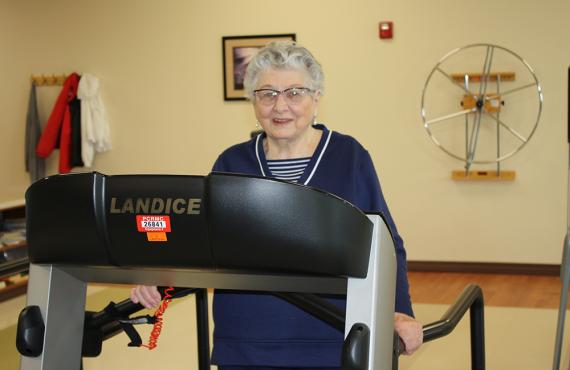Published on July 5, 2023

Read Time: 3 Minutes
Three Things to Know
- Arthritis can affect anyone. About one in four adults in the US have this condition.
- Symptoms of arthritis can include pain, stiffness, swelling and decreased motion.
- Your diet and physical activity level can play a big part in preventing arthritis.
By Brett Clayton, PA-C
Phelps Health
Your joints are like car tires. Just as the tread wears off your tires, you can lose cartilage from your joints as you age. This loss of cartilage can lead to joint problems, such as arthritis, which is the swelling or inflammation of a joint.
Everybody can get arthritis, at least to some degree. In fact, about one in four adults in the US, or an estimated 58.5 million Americans, have this condition.
Children can have juvenile rheumatoid arthritis, an autoimmune disease (when your immune system attacks your body instead of protecting it). Some people with injuries and damage to their joints can get post-traumatic arthritis.
Another type of arthritis known as osteoarthritis is seen mainly in older adults. Most arthritis patients who come to the Phelps Health Orthopedics Clinic are in their late 40s and older. Osteoarthritis is usually found in people who are more physically active and who have had a lot of injuries to their joints.

People with particular jobs or who participate in certain activities, such as physical laborers or athletes, may be more prone to arthritis. Some individuals with certain genes may have joints that simply wear out faster than others.
Certain types of arthritis can be hereditary, such as rheumatoid arthritis. This condition can run in people’s families because it’s an autoimmune form of arthritis. While some cases of arthritis have a genetic component, your lifestyle also can affect whether you get this disease or not.
Just because your parents or grandparents had arthritis doesn’t necessarily mean you will get it. If you maintain a healthy lifestyle – eat a balanced diet and stay active – you might still have arthritic changes, but you may be able to better manage the arthritis.
How do you know if you have arthritis? Being able to tell can be difficult. Arthritic symptoms can include pain, stiffness, swelling and decreased motion. Some patients also complain that their joints “crack, grind or pop.”
If you have pain that persists for a couple of weeks, and rest, ice and stretching don’t improve the pain, you may want to see your doctor.
The best way to determine if you have arthritis is to get an X-ray. Your orthopedic provider will review the scan and perform a physical examination. In some cases, a magnetic resonance imaging (MRI) scan can better show the cartilage loss.
Rheumatoid arthritis, which again is caused by an autoimmune disease, can be identified through bloodwork.
While no cure exists for arthritis, several treatment options are available. After your diagnosis, you and your provider can review the best treatment course moving forward. Some nonsurgical options include the following:
- Braces, canes or walkers
- Medication
- Joint injections
- Lifestyle changes
- Physical therapy
Joint replacement surgery is usually the last option considered to treat arthritis.
The type of treatment recommended for you will depend on how arthritis is affecting your quality of life. Are you have trouble sleeping, walking or getting up and down?
The good news is that arthritis is often preventable. If you smoke, or if you have uncontrolled diabetes or high blood pressure, these habits and conditions can make your arthritis worse.
Your diet also plays a role. Studies have shown that losing 5 to 10 pounds can make a huge difference by reducing pressure on your knees.
Exercise also is beneficial for managing arthritis pain. Try to strike a balance and avoid physical overexertion that may result in an injury. Moderate exercises, like walking, yoga or even golf, can have a positive impact in your overall joint health.
Remember, if you take good care of your car tires, your vehicle will last longer. Your joints will last longer, too, when you properly care for them.
Suffering From Arthritis Symptoms?
Brett Clayton, PA-C, is a certified physician assistant who specializes in orthopedics at Phelps Health. To learn more, call Phelps Health Orthopedics at (573) 364-5633.

